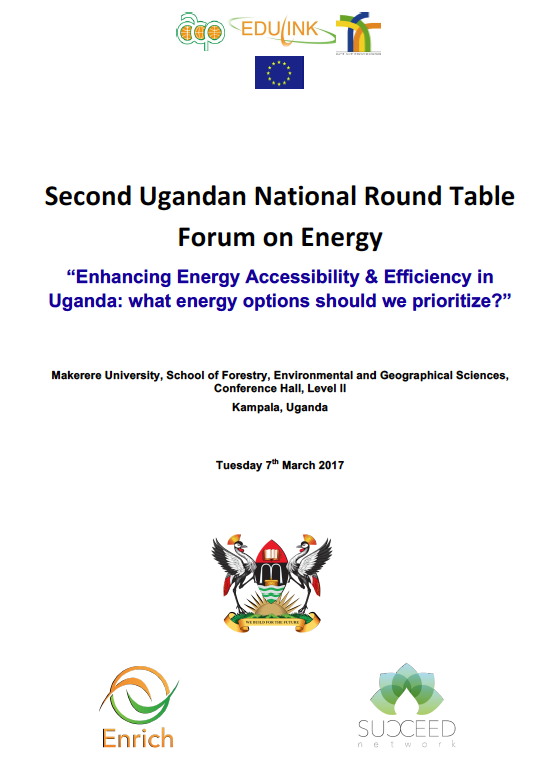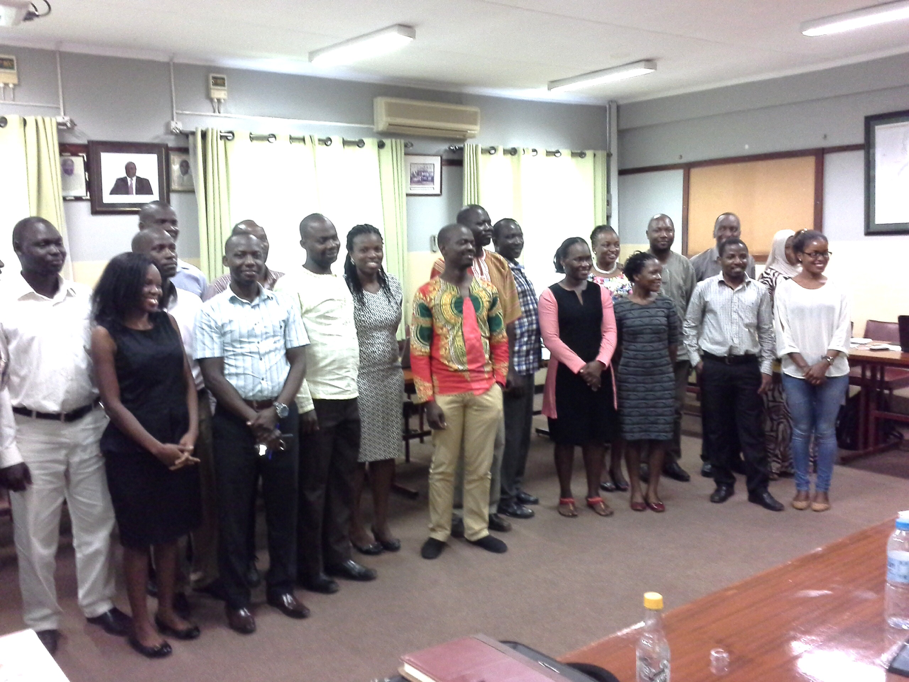Date:
Venue:
 The 2nd National Round Table Forum on Energy “Enhancing Energy Accessibility & efficiency in Uganda: what energy options should we prioritize?” was held on March 7th at Makerere University in Kampala, in the framework of the ACP S&T project ENRICH & the Edulink project SUCCEED Network. The event was jointly organized by Makerere University and the Uganda National Council for Science and Technology.
The 2nd National Round Table Forum on Energy “Enhancing Energy Accessibility & efficiency in Uganda: what energy options should we prioritize?” was held on March 7th at Makerere University in Kampala, in the framework of the ACP S&T project ENRICH & the Edulink project SUCCEED Network. The event was jointly organized by Makerere University and the Uganda National Council for Science and Technology.
The aim of the event was to bring together the main stakeholders in the field of energy in Uganda (including higher management and researchers from Higher Education Institutions, research & project managers, policy makers, managers from energy industries, experts) to exchange ideas and discuss energy issues at a national level in Uganda. The discussions focussed specifically on the theme: “Enhancing Energy Accessibility & Efficiency in Uganda: what energy options should we prioritize?”
The specific objectives of the National Round Table were to:
- Discuss the options for Uganda in the field of Energy affecting National Stakeholders, with the idea of identifying where the Higher Education System could contribute with specific services/input.
- To discuss the topic: “Enhancing Energy Accessibility & Efficiency in Uganda: what energy options should we prioritize?”
- Enhance awareness of the real needs of Science, Technology and Innovation (STI) related to energy access and efficiency in Uganda.
- Encourage dialogue and strengthen co-operation links in the energy sector at national level among academia, researchers, industries and policy makers.
- Present the ENRICH & Succeed Network projects and their developments.
The National Round Table brought together several relevant stakeholders in the field of Energy in Uganda, including representatives from various colleges in Makerere University, its Higher Management and its Planning and Development Department, from the Local District Government and from the Uganda National Council for Science and Technology.

Participants in the 2nd National Round Table Forum on Energy at Makerere University
At the end of the presentations and discussions, the participants reached the following conclusions:
- Preference for any form of energy is based on how advanced the people are – often the people will go for the cheapest energy option. Thus most households still use biomass because that’s what they can afford.
- HEP is still the best option for industrialisation. It can support the heavy industries as compared to biomass.
- Adoption of some energy options is limited by the available technologies. Biogas is limited, for example, because of the difficulty and cost of local storage. It would otherwise be the most efficient and clean use of biomass.
- Solar power would probably be the best energy option for Uganda, but the period for return on investment at the household level is longest and panels are too expensive. Moreover, storage of solar energy for domestic use is still a big problem. This means that it can mainly be used directly to cook during the daytime.
- The commercialisation of research ideas in the energy field in Uganda is too slow. The government is definitely to blame for this.
- There appears not to be sufficient justification for nuclear energy given the limited technological advancement of Uganda, sustainable funding options and safety issues.
Based on these conclusions a series of recommendations were made for successful development of the priority energy options for Uganda:
- Develop a clear research agenda for the renewable energy sector
- To promote the use of solar energy, lower the cost of solar equipment using incentives such as tax exemption.
- Eliminate duplication of efforts in electrification, and renewable energy technologies
- Promote sharing of lessons/vital information by actors in the renewable energy industry. The Enrich project provides one of these avenues
- Promote community involvement in renewable energy projects
- Develop clear standards for developments within the renewable energy sector
- Train technical in tertiary institutions to meet the energy sector demands
- Establish funding opportunities for research including private sector contribution. These may be channeled through the National Council for Science and Technology
The full Report of the 1st Uganda National Round Table on Energy is available at our website.


